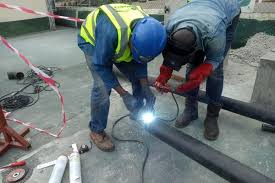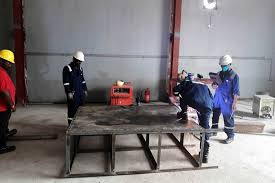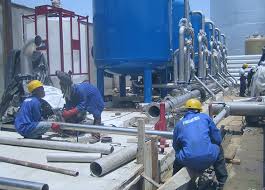![]()
If you’ve landed on this article page, you’re probably searching for a
good business idea—an idea that’s light on the pocket but heavy on
returns, promising both a fulfilling journey and potential profit.
|
How to start a lucrative Welding & Metal
Fabrication Business in Nigeria
Welding involves fusing materials, typically metals, using high
heat to melt the parts together and allowing them to cool,
causing fusion. Fabrication is the process of creating metal
structures by cutting, bending, and assembling processes.
Together, these services form the backbone of metalworking
industries, enabling the creation of everything from simple
tools to complex structures.
Metal fabrication involves creating structures from raw metal
materials using cutting, bending, welding, machining and
assembly processes. Starting a metal fabrication workshop in
Nigeria can be a profitable business venture due to the high
demand for fabricated metal products in construction, oil and
gas, manufacturing and other industries. With proper planning,
an efficient production setup and quality control, a metal
fabrication workshop can thrive in the Nigerian market.
As a welder, you will cut, shape and join sections of metal. You
may also carry out repairs on manufacturing equipment and
machinery. The welding and fabrication industry is embedded in
every aspect of our lives, from the cars we drive to the
construction of the buildings we work in.
Types of Welding Techniques
MIG Welding (Metal Inert Gas): Uses a continuously feeding wire,
is easy to learn, and is efficient for joining thin or thick
metals.
TIG Welding (Tungsten Inert Gas): Known for its precision, it
allows for stronger and higher quality welds in more delicate
metal.
Stick Welding: Uses an electrode that doubles as the filler
material, suitable for outdoor conditions and thicker materials.
Tools and Equipment Used in Welding and Fabrication
1. Essential Tools and Equipment
The primary tools for a welding and fabrication shop include
welding machines, cutting torches, grinders, and safety gear
like helmets and gloves. Advanced equipment may include CNC
(Computer Numerical Control) machines for precise cutting and
shaping, and plasma cutters for efficient metal slicing.
2. Recommendations for Suppliers and Brands
It's important to purchase high-quality tools from reputable
suppliers to ensure reliability and efficiency. Brands such as
Lincoln Electric, Miller, and Hobart are renowned for their
welding equipment. In Nigeria, suppliers like GZ Industrial
Supplies offer a range of quality products and support services.
Skills and Training
. Necessary Skills for Welders
Welders need a solid understanding of different metals and their
properties, as well as proficiency in various welding
techniques. Critical thinking and problem-solving are also
essential to address the challenges that may arise during
welding processes.
Cutting Equipment:
Metal cutting band saws – For straight line cuts on metal stock
and plates. Choose automatic feed saws for high cutting
accuracy.
Abrasive chop saws – For precise abrasive cuts through metal.
Ideal for cutting tubes, pipes etc.
Plasma cutters – For faster and cleaner cuts through thick steel
and other conductive metals.
Oxy-fuel cutting torches – For manual cutting of mild steel
plates up to 8 inches thick. Needs a compressed gas supply.
Ironworkers – Has punching, shearing and notching heads for
cutting metal stock into custom lengths and shapes.
Sheet metal cutting shears – Either manual or electric shears
for cutting sheet metal.
Metal Forming Equipment
Press brakes – For bending sheet metal and plates into custom
angles and shapes. Choose CNC brakes for precision bending.
Stamping presses – Used with press brake or hydraulic presses to
form complex metal component shapes.
Tube benders – Enables bending tubes and pipes into coils, rings
or custom shapes.
Metal rolling machines – Allows pre-bending and forming of sheet
metal before welding.
Slip rollers – Creates cylindrical shapes by rolling sheet metal
into tight radii.
Punch and notch machines – To punch holes or notch metal plates.
Can be stand-alone or integrated with hydraulic presses.
Welding Equipment
MIG welders – Best for thinner gauge metals like sheet metal.
Easier to learn and use.
TIG welders – For highest quality welds on stainless steel or
thinner metals. Needs a skilled operator.
Stick welders – Most heavy-duty option suitable for thick
structural metals. Economical choice.
Multi-process welders – Allows switching between MIG, TIG, stick
welding as needed. Added flexibility.
Engine drives – Portable power source for welding equipment.
Useful for on-site fabrication needs.
Plasma cutters – Creates narrow, clean cuts needed for welding
preparation.
Welding positioning equipment – Positioners, tables, clamps etc.
for securing metals during welding.
Welding safety equipment – Auto-darkening helmets, respirators,
protective clothing etc.
Metal Finishing Equipment
Grinders – For grinding, deburring and finishing of welded
pieces. Get both bench and handheld grinders.
Sandblasters– Removes rust, paint or corrosion through abrasive
blasting. Requires air compressor.
Hydraulic shears – Trims edges and creates bevelled cuts on
metal pieces.
Magnetic drills – Portable magnetic drills for bolt holes,
countersinking etc.
Ironworker – For punching, notching, shearing metal
post-welding.
Prioritize equipment investments based on the type of
fabrication work undertaken. Maintain machines properly for
longevity.
Hire Skilled Metal Fabrication Staff:
Experienced metal fabricators and welders are vital for quality
fabrication work. Consider the following when hiring staff:
Metal fabrication technicians – Should have 1-3 years of
workshop experience in operating equipment like shears, presses,
welders etc.
Skilled welders – Look for certified welders trained in
processes like MIG, TIG, stick welding based on your
requirements.
Engineers/Drafters – For technical drawings, designing jigs, CAD
assistance. Especially important for complex fabrication jobs.
Helpers – For assisting with metal preparation, post-welding
finishing, equipment maintenance etc. Opt for strong candidates.
Management – Workshop manager for overseeing daily operations,
procuring materials, and quality checks. Sales staff are also
needed.
Apprentices – Consider training dedicated apprentices to build a
skilled talent pipeline.
Conduct skills evaluations thoroughly during hiring. Ensure
workplace safety training is provided.
Consistently delivering high-quality fabrication is crucial for
business sustainability. Key aspects of an effective quality
control system include:
Inspection protocols – Inspect raw materials, finished and
in-process fabrication thoroughly based on checklists.
Quality training – Provide extensive quality training to
fabricators and welders. Encourage awareness of quality
standards.
Quality documentation – Maintain records of all equipment
inspections, quality checks, defects, corrective actions etc.
Quality equipment – Invest in measuring tools like callipers,
and micrometres as well as testing equipment like dye penetrant
kits.
Accountability – Clearly define quality responsibilities for
each role. Hold staff accountable for defects.
Rework process – Establish systematic rework procedures to fix
identified defects.
Continuous improvement – Use feedback, defects data, audit
reports etc. to continuously improve quality.
Controlling quality from the start minimizes rework, and
customer rejections and enhances your brand’s reputation.
Streamline Your Production Workflow
Carefully plan your workshop layout and operations flow to
maximize roductivity. Key steps include:
Create shop floor plan – Layout workstations, equipment,
materials, finished goods and WIP areas in a logical workflow.
Setting competitive but profitable prices
Ensure that your pricing is competitive in the market while
allowing for a reasonable profit margin. Consider factors such
as the quality of your work, the value you provide to clients,
and your reputation. Avoid the temptation to undercut
competitors significantly, as this may undermine the perceived
value of your services. Regularly review your pricing to ensure
it aligns with your business goals and market conditions.
Starting a profitable metal fabrication workshop in Nigeria
needs thorough planning, sizeable startup investment, business
acumen and a customer-centric approach. Pay close attention to
hiring skilled staff, implementing quality control procedures
and maintaining rigorous safety standards. With tenacity and
execution excellence, your business can gain a strong foothold
in Nigeria’s metal fabrication industry.
Get our Practical Training Guide on how to start a lucrative welding and fabrication Business in Nigeria. This training program is designed to empower new entrants to become skillful in the area of welding and metal fabrication. This is a well sought-after skill in the manufacturing, construction industrial sectors. Fabrication involves making products and components for the engineering and manufacturing industries from raw or semi-finished materials. This guide will provide a comprehensive overview of the welding and fabrication services in Nigeria, covering everything from the basic techniques and tools used to the legal and business aspects of setting up a welding workshop. Whether you're a seasoned welder, a newcomer to the field, or an investor, this guide aims to equip you with the knowledge needed to succeed in the Nigerian welding industry.
|







